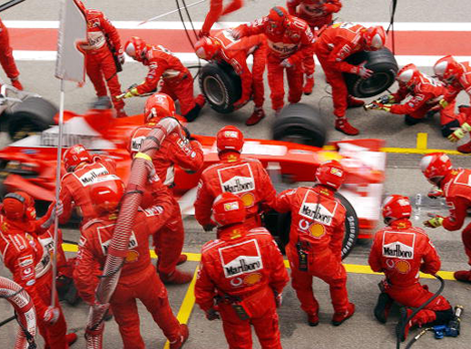
Click for more




 (0)
(0)




 (0)
(0)




 (0)
(0)




 (0)
(0)




 (0)
(0)




 (0)
(0)




 (0)
(0)




 (0)
(0)




 (0)
(0)
Click for more




 (0)
(0)




 (0)
(0)




 (0)
(0)
Click for more




 (0)
(0)




 (0)
(0)




 (0)
(0)




 (0)
(0)




 (0)
(0)

The seventeenth and final round of the 2002 Formula 1 season is the Japanese Grand Prix. To underscore the Ferrari teamâs superlative season, Michael Schumacher begins the race in pole position, records the fastest lap and takes the chequered flag.
He has made the podium in every round of the championship, coming either first or second, with only one third place, in Malaysia. With a total of 144 points, Schumacher is World Champion by a record 67 points from the nearest contender, his own Ferrari teammate Rubens Barrichello.
In fact, Schumacher had wrapped up the title at the French Grand Prix with six rounds to go. Ferrari, having won fifteen out of the seventeen rounds, with twenty-seven podium finishes, take the Constructorsâ Championship by an even greater margin â on 221 points, more than all the other teamsâ points combined. Extract from Superteams
In the 1980s and early 1990s the Ferrari F1 team â rich in Grand Prix heritage and blessed with the most loyal of fans, the tifosi â was struggling.
The proud prancing black horse had developed a severe limp. Political infighting, internal bureaucracy and lack of technical innovation had seen the team easily overtaken by the likes of Williams and McLaren.
The Ferrari renaissance, led by Luca di Montezemolo and Jean Todt, had one ambition: to make Ferrari winners once again.

Securing the right talent â the driving genius of Michael Schumacher, the tactical and technical brilliance of Ross Brawn â was only part of the story. Ferrari analysed every single aspect of its operation, every component of the car, every second of a pit stop, every role within the team.
Theirs would be a team success: Michael Schumacher, the star driver, knew instinctively that he would only succeed because every member of the team amplified and multiplied each otherâs skills and knowledge.
![]() (0)
(0)
Constantly reviewing their achievements, continually adapting, the Ferrari F1 team returned to total dominance.

There was so much trust between us. We all had slightly different talents and there was immense respect for what each person brought to the collaboration. It doesnât matter whose idea it is. We use the one that makes the movie better.â John Lasseter > To Pixar

I didnât hit a shot out there. My players all played magnificently, all twelve of them.â Colin Montgomerie > To Ryder Cup team

ââWho dares winsâ is a way of life. It is living and breathing this motto that makes the SAS the best at what they do.â Andy McNab > To SAS

âGood enough is never going to be good enough. It sounds dramatic, but what we are doing in those early days is saving lives, and you are never ever going to be good enough.â Mike Goodhand, Head of International Logistics, British Red Cross > To Red Cross

The Rolling Stones is a vehicle that only works when we put it in motion.â Ronnie Wood > To Rolling Stones

Dialogue is crucial to any effort to find a solution to conflict.â Gerry Adams > To Northern Ireland Peace Process
A BETTER TEAM
As you navigate through this site, create your own agenda for building a better team. Simply click on the ![]() icon to add an item to your agenda, or add your own thoughts.
icon to add an item to your agenda, or add your own thoughts.
Register with Superteams.org to either SHARE your Agenda by email or SAVE it. Then next time you login it will be immediately available for you to review and update.
You can also ask to receive updates from Superteams, or request direct assistance by emailing team@superteams.org
